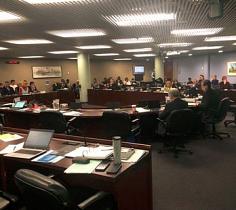Frontline workers want more from Toronto’s transit plan for those in poverty
Toronto’s executive committee has plotted out the next four years of the City’s poverty reduction plan and while it commits to fully implementing a plan to make transit more affordable, critics say they still find it lacking.
The Toronto Transit Commission’s Fair Pass program offers discounted trips for TTC users on social assistance and in lower-income brackets. It has been rolling out in phases to include more groups, but many think it hasn’t been implemented fast enough and that it’s still cost prohibitive for those who need it the most.
Those who qualify for the Fair Pass program pay $2.05 for a single ride instead of $3.10. For a monthly pass, the savings are much greater. It costs $119.40 a month versus $151.15. So far, the only people who qualify for it are people on social programs like Ontario Works (OW) and the Ontario Disability Support Program (ODSP), along with parents who get the child care fee subsidy.
Susan Bender has been a long-time member of the Fair Fare Coalition, which has been fighting for transit equity. She is also the manager of the Toronto Drop-In Network. Bender said those on social assistance see their income depleted by a third once they purchase a monthly Fair Pass.
“Really the bottom line is the pass as it is now is not affordable,” said Bender, adding the amount of people who qualify for the program is quite low because they can’t afford to load fares onto a pass.
Rachel Goel works with Sistering, a drop-in network for women that helps provide services for housing, training, and food. She echoed concerns that the Fair Pass was too expensive for the women she works with, often forcing them to make difficult choices.
“Most of the time you have to choose between getting food or rent, or paying rent, or things like that,” said Goel.





